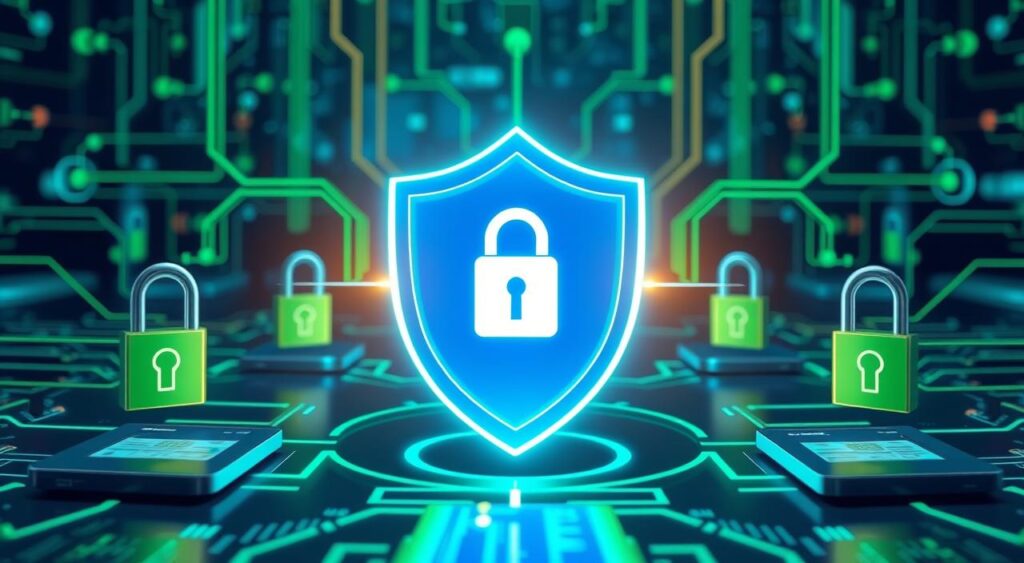In the world of technology, firewalls protect our devices from harm. They watch over incoming and outgoing data. In dealing with narcissists, creating a strong emotional firewall is key to keeping our minds safe1.
Narcissists are like sneaky hackers. They find and use our emotional weak spots. They try to break down our defenses and mess with our feelings. So, what is firewalling a narcissist?
Setting clear boundaries is like having a firewall for our feelings1. It helps keep the narcissist from getting too close. Healthy boundaries are limits we set with others. But, setting these limits with narcissists can be really hard1.
Key Takeaways
- Firewalling a narcissist means creating emotional and psychological barriers to protect yourself from their manipulative tactics.
- Knowing the narcissist’s true motives and setting clear boundaries are key steps in building your emotional firewall.
- Using the Gray Rock Method, No Contact, and the Firewall Method can help limit the narcissist’s access to your emotional and psychological resources.
- Keeping your emotional defenses up through self-care and adapting to the narcissist’s tactics is vital for long-term protection.
- Getting support from trusted people or professionals can help you deal with the challenges of a narcissistic relationship.
Recognizing the Narcissistic Threat
The first step in protecting our emotional well-being is to spot the narcissistic threat. Narcissists have a hidden plan, aiming to exploit our weaknesses for control. They search for vulnerabilities in our defenses, using charm and manipulation to get past our barriers. Once we know their true intentions, we can set up strong defenses against their harm.
Recognizing the Narcissistic Threat
Before knowing what is firewalling a narcissist let’s discuss narcissistic threat.
Research shows that women often face more trauma early in life, and about 73.3% of them show signs of Complex Post-Traumatic Stress Disorder (C-PTSD)2. Yet, only a small fraction, 4.2%, have been officially diagnosed. This shows how crucial it is to recognize the narcissistic threat and its impact on our emotional health. Knowing their tactics helps us protect our hearts and minds.
Moreover, studies reveal that narcissistic abuse can make C-PTSD symptoms worse, even with early-life trauma considered2. This highlights the unique harm narcissistic abuse can cause. It’s vital to build strong emotional defenses to shield ourselves.
| Characteristic | Percentage |
|---|---|
| Early-Life Trauma | 4 times higher than normative statistics |
| C-PTSD Criteria | 73.3% |
| Diagnosed with C-PTSD | 4.2% |
| Above-Average Empathy | Over 50% |
| Super Empathizers | 12.6% |
The data also shows that high empathy can lead to more severe C-PTSD symptoms, but the impact is small2. This warns of the risk for those who are very empathetic, making it even more crucial to have strong emotional defenses.
Furthermore, research found that traits like altruism and self-directedness can also increase C-PTSD symptoms when early-life trauma is considered2. This points out the challenges faced by those with positive traits, stressing the need for strong emotional boundaries against narcissists.
“Once we become aware of the narcissist’s true nature, we can begin to implement stringent security protocols to protect ourselves from their destructive influence.”
Configuring Your Emotional Firewall
Dealing with a narcissist means setting clear, firm boundaries. This is like a firewall for our emotions. It keeps out the narcissist’s harmful tactics3.
To build this firewall, decide what you’ll allow and what you won’t. Tell the narcissist your limits clearly. Stick to these rules to keep your mind and heart safe3.
Establishing Firm Boundaries
Creating strong boundaries against narcissists is a detailed task. Here are some important steps:
- Know your core values and what you won’t compromise on. These are the basics of your emotional shield.
- Tell the narcissist your limits clearly and without doubt. Make sure they understand you.
- Always stick to your boundaries, even if the narcissist tries to push you. Stay firm.
- If the narcissist keeps crossing your lines, be ready to step back or cut ties. Your health is more important.
By setting and keeping these boundaries, you take back control. You show the narcissist you won’t be abused3.

Dealing with a narcissist is tough, but a strong emotional firewall helps. It lets you protect your mind and heart. You can then live your life despite the narcissist’s tricks3.
Implementing Strict Access Controls
When dealing with narcissists, setting clear and firm personal boundaries is key4. We need to define what behaviors and interactions are okay and what will get a block4. By telling them our strict boundaries with narcissists clearly and consistently enforcing them, we protect our emotional health4.
It’s important to limit access to narcissists and keep control over the relationship5. This might mean limiting how we communicate, setting specific times to talk, or even a “no contact” rule6. By enforcing personal boundaries, we stop them from manipulating and using us5.
Remember, setting boundaries with a narcissist is tough and ongoing6. We must stay alert and consistent because narcissists will test our boundaries6. By being firm and not playing their games, we can take back control and protect our emotional health6.

“Establishing and maintaining clear boundaries is a powerful tool in dealing with narcissists. It sends a strong message that their manipulative behavior will no longer be tolerated.”
Prioritizing Your Needs
Setting strict access controls also means putting our needs first5. This could mean sharing less info, setting limits on visits or talks, and focusing on self-care5.
By doing this, we can gain control away from the narcissist and feel more secure and in charge in our relationships6. It’s a tough path, but it’s crucial for our mental and emotional health6.
| Strategy | Description |
|---|---|
| No Contact | Completely cutting off all communication with the narcissist, including social media, phone calls, and texts6. |
| Low Contact | Minimizing interactions with the narcissist and limiting them to essential matters6. |
| Gray Rocking | Responding in a disinterested and emotionally non-responsive manner to discourage the narcissist’s engagement6. |
By using these strategies and enforcing personal boundaries, we can effectively limit access to narcissists and take back control in our relationships6.
Enabling Two-Factor Authentication
In today’s digital world, two-factor authentication adds an extra layer of security. It requires a second form of verification7. When facing a narcissist, it’s key to use external validation and reality-checking. Talking to trusted friends, family, or a therapist can offer a fresh view. This helps us spot and stop narcissistic tricks.
Setting up two-factor authentication against narcissists is like creating a digital shield. It protects our personal info and emotional health. Just as it needs more than one step to confirm our identity, we must be careful with the narcissist’s words. Seeking outside help can help us see the truth and keep our boundaries strong7.
| 2-Factor Authentication Options | Success Rate |
|---|---|
| “Tap Yes” | Unsuccessful |
| “SMS Code (Recommended)” | Unsuccessful |
| “Authenticator” | Successful |
| “Backup Code” | Unsuccessful |
| “Offline Code” | Unsuccessful |
Using external validation against narcissists strengthens our emotional shield. It helps us make better choices about their claims and actions78. This approach helps us dodge their tricks and stay safe from their harm.
“Nadene van der Linden, a clinical psychologist, recommends the grey rocking technique to clients dealing with toxic individuals.”8
While grey rocking can work in some cases, it’s not always enough8. Against a narcissist, we need more than just this method. Adding two-factor authentication and external validation makes our emotional shield stronger.

Embracing External Validation
Getting outside help and checking facts with trusted people is a strong defense against narcissists9. By constantly checking the narcissist’s words and actions, we learn their twisted views. This helps us make choices that keep us safe and happy.
Narcissists often can’t take blame and make excuses to avoid responsibility9. With outside help, we can see through their excuses. This lets us understand the situation better and set healthy limits.
Valuing outside opinions is key to protecting ourselves from narcissists. It helps us spot their tricks, believe in our own feelings, and choose what’s best for our mental health9.
Running Regular System Scans
Narcissists use gaslighting to make us doubt our own thoughts and memories10. To fight this, we need to check our emotional health often. Writing in a journal, thinking deeply about ourselves, and talking to a therapist can help us spot and remove false beliefs11.
Experts say only 0.05 percent of cyber threats are caught in the U.S10. So, we must act fast to protect ourselves from narcissists. By regularly checking our thoughts and feelings, we can spot gaslighting and keep our emotional health safe.
- Writing down our experiences can help us scanning for narcissistic abuse and identifying gaslighting. It helps us see patterns in the narcissist’s behavior.
- Meditation or guided exercises can help us engage in self-reflection against narcissists. They help us find out why we’re so open to their tricks.
- Talking to a therapist or counselor gives us a fresh view. They help us scan for narcissistic abuse and learn how to defend ourselves emotionally.
By actively checking our emotional health, we can strengthen our defenses against narcissists. This way, we can take back our sense of self and reality11.

The fight against a narcissist is constant. It requires us to stay alert and take care of ourselves. By regularly checking our emotional systems and updating our defenses, we can shield ourselves from their harm. And we can take back our lives1011.
Updating Your Emotional Antivirus Software
Just like antivirus software, our emotional defenses need updates to fight new threats. We must learn about narcissistic abuse, join support groups, and get professional help12. This keeps us strong against the narcissist’s changing plans.
Defending against emotional manipulation is like protecting our devices from cyber threats. The text shows how narcissists use malware to steal our info, just like cyber threats target our tech12. So, we must keep updating our emotional defenses to stay ahead of the narcissist’s tricks.
Fortifying Your Emotional Firewall
Adapting to narcissistic tactics is ongoing, like updating antivirus software. Here are ways to strengthen your emotional defense:
- Join support groups to learn from others who’ve faced narcissistic abuse12.
- Get help from therapists who know about emotional abuse and narcissism12.
- Keep up with the latest research on fighting narcissistic manipulation12.
- Learn about the narcissist’s new tactics to stay one step ahead12.
By actively updating our emotional defenses, we can shield ourselves from narcissists. Just as in the digital world, staying alert and adaptable is crucial for protecting our emotional health12.
“The narcissist’s tactics are constantly evolving, so our emotional defenses must also adapt and strengthen over time. Continuous education and support are essential for maintaining a robust firewall against their manipulation.”
What Is Firewalling a Narcissist
Creating a strong emotional firewall is a continuous effort. It needs constant attention, commitment, and kindness to oneself. We must spot the narcissist’s harmful plans, set clear limits, find support from others, and keep our defenses strong13. Like IT experts protect digital data from hackers, we must guard our emotional health from narcissistic harm13. A strong emotional firewall helps us fight off the narcissist’s attacks and regain our self-respect and freedom.
“Firewalling a narcissist” means using smart strategies to keep emotional boundaries strong. This helps block the narcissist’s harmful ways13. We can use methods like the Gray Rock Method, Yellow Rock Method, Firewall Method, Low Contact Method, and No Contact Method. These methods help reduce the narcissist’s power by limiting their “supply” of attention13.
The Low Contact Method is for when you can’t avoid the narcissist completely. It’s useful at big events like weddings or court cases13. The Firewall Method is great for fighting off manipulative tactics like gaslighting and love bombing13.
Experts say methods like the Gray Rock Method and Firewall Method work well against narcissists. They help protect our sanity and well-being1314.
“The strategy of Firewalling, which involves strengthening mental boundaries and practicing self-care when dealing with narcissists, can be highly effective in preserving inner peace and stability.” – Dr. Judith Orloff, author of “The Empath’s Survival Guide”14
By building a strong emotional firewall, we protect ourselves from narcissists. We regain our self-worth and keep our emotional health safe1314.
Performing Regular System Maintenance
To keep our emotional firewall strong, regular self-care is key. Doing things that recharge us, boost our self-esteem, and improve our emotional well-being helps us fight off narcissistic attacks15. Without constant attention, narcissists can feel lost, have mental breakdowns, and suffer greatly15.
Looking after ourselves is like running updates on our inner software. When we focus on our self-worth and practice self-care, we build a strong emotional base. This base helps us resist the narcissist’s efforts to chip away at our confidence and freedom16. Hidden narcissism can cause serious mental harm, like PTSD, showing how crucial it is to take care of ourselves16.
By always looking after our emotional health, we strengthen our defenses against narcissists. This helps us stay strong and deal with the tough situations these manipulative people bring17. Learning better ways to interact with others through emotional intelligence can also help us handle difficult bosses17.
FAQ
What is firewalling a narcissist?
Firewalling a narcissist means setting up strong emotional barriers. These barriers protect your mental health from the harm caused by narcissistic abuse. It’s like a digital firewall but for your emotions, keeping a narcissist from getting too close.
How do I recognize the narcissistic threat?
First, you need to see the narcissist’s true intentions. They have a hidden plan to control and dominate you. They use tricks like charm and gaslighting to get past your defenses and into your heart and mind.
How do I configure my emotional firewall?
Setting up your emotional firewall is like setting rules for your network. You need to decide what behaviors are okay and what isn’t. By being clear and firm about your boundaries, you create a safe space for your emotions.
How do I implement strict access controls?
To limit a narcissist’s influence, you need to set strict boundaries. This might mean cutting off contact or avoiding certain situations. It’s about protecting your emotional space.
How do I enable two-factor authentication?
Relying on others for validation is key when dealing with a narcissist. Talking to trusted friends or a therapist can help you spot and block their manipulation.
How do I run regular system scans?
Narcissists use gaslighting to make you doubt yourself. To fight this, regularly check your thoughts and feelings. Writing in a journal or talking to a therapist can help you spot and deal with their influence.
How do I update my emotional antivirus software?
Your emotional defenses need to stay updated to fight off new narcissistic tactics. Keep learning about narcissistic abuse, join support groups, and seek professional help. This keeps you strong against their changing plans.
What is the definition of firewalling a narcissist?
Firewalling a narcissist means creating strong emotional barriers. It’s about protecting your mental health from narcissistic abuse. It’s like building a strong emotional firewall to keep a narcissist out.
How do I perform regular system maintenance?
To keep your emotional firewall strong, take care of yourself. Do things that make you feel good and boost your self-esteem. Taking care of yourself is like doing maintenance on your emotional system, keeping it ready to defend against narcissists.
Source Links
- How to Protect Yourself From a Narcissist (6 Strategies) – Unfilteredd – https://unfilteredd.net/how-to-protect-yourself-from-a-narcissist/
- Moth to a Flame: An Investigation of the Personality Traits and Early-Life Trauma Histories of Women Who Have Survived Adult Relationships with Men with Pathological Narcissism – https://irl.umsl.edu/cgi/viewcontent.cgi?article=2091&context=dissertation
- Schizoid Personality and Schizoid Narcissism Bible (Compilation) – https://vaknin-talks.com/transcripts/Schizoid_Personality_and_Schizoid_Narcissism_Bible_Compilation/
- How to Deal with Narcissism in the Workplace with Chuck DeGroat (Ep102) – https://www.betsyjordyn.com/podcasts/enough-already/episodes/2148570455
- 25 Best Tips for Dealing with Narcissists as Co-Parents – Grace Wroldson – https://gracewroldson.com/25-best-tips-for-dealing-with-narcissists-as-co-parents/
- Ask Dr. Ramani: How To Go “No Contact” with a Narcissist Podcast Summary with Advertisement, Ramani Durvasula – https://www.shortform.com/podcast/episode/navigating-narcissism-with-dr-ramani-2023-09-28-episode-summary-ask-dr-ramani-how-to-go-no-contact-with-a-narcissist
- Trouble Getting Scraper to the Correct 2FA Type When Logging Into a Google Account – https://stackoverflow.com/questions/77876738/trouble-getting-scraper-to-the-correct-2fa-type-when-logging-into-a-google-accou
- Grey Rocking: What this Method is and How To Do It (and when not to) – https://www.betterup.com/blog/grey-rocking
- Does The Narcissist Know What He Or She Is Doing? – https://blog.melanietoniaevans.com/does-the-narcissist-know-what-he-or-she-is-doing/
- 8 Dangerous Cyber Security Threats Learn Basics to Protect Business – https://www.linkedin.com/pulse/8-dangerous-cyber-security-threats-learn-basics-rokon-tuli
- Cybercrime’s Dark Triad – https://securityboulevard.com/2021/03/cybercrimes-dark-triad/
- Safe Surfing: Narcissist Invades Your Computer – https://vaknin-talks.com/transcripts/Safe_Surfing_Narcissist_Invades_Your_Computer/
- When Will a Narcissist Give Up? – Unfilteredd – https://unfilteredd.net/when-will-a-narcissist-give-up/
- The 7 Strategies for Communication with a Narcissist… — Daniel Dashnaw – https://danieldashnawcouplestherapy.com/blog/strategies-for-communicating-with-a-narcissist
- How Narcissist Falls Apart (Compilation) – https://vaknin-talks.com/transcripts/How_Narcissist_Falls_Apart_Compilation/
- Unmasking The Hidden Manipulators – FasterCapital – https://fastercapital.com/topics/unmasking-the-hidden-manipulators.html
- Copy of Crawshaw Dissertation – https://bosswhispering.com/Coaching-Abrasive-Executives.pdf







